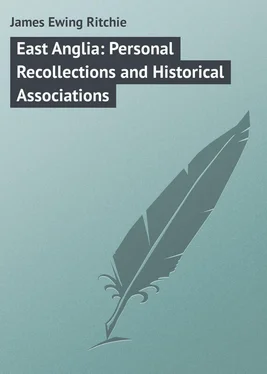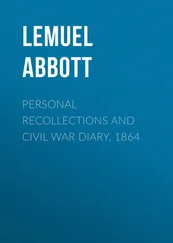James Ritchie - East Anglia - Personal Recollections and Historical Associations
Здесь есть возможность читать онлайн «James Ritchie - East Anglia - Personal Recollections and Historical Associations» — ознакомительный отрывок электронной книги совершенно бесплатно, а после прочтения отрывка купить полную версию. В некоторых случаях можно слушать аудио, скачать через торрент в формате fb2 и присутствует краткое содержание. Жанр: foreign_prose, на английском языке. Описание произведения, (предисловие) а так же отзывы посетителей доступны на портале библиотеки ЛибКат.
- Название:East Anglia: Personal Recollections and Historical Associations
- Автор:
- Жанр:
- Год:неизвестен
- ISBN:нет данных
- Рейтинг книги:5 / 5. Голосов: 1
-
Избранное:Добавить в избранное
- Отзывы:
-
Ваша оценка:
- 100
- 1
- 2
- 3
- 4
- 5
East Anglia: Personal Recollections and Historical Associations: краткое содержание, описание и аннотация
Предлагаем к чтению аннотацию, описание, краткое содержание или предисловие (зависит от того, что написал сам автор книги «East Anglia: Personal Recollections and Historical Associations»). Если вы не нашли необходимую информацию о книге — напишите в комментариях, мы постараемся отыскать её.
East Anglia: Personal Recollections and Historical Associations — читать онлайн ознакомительный отрывок
Ниже представлен текст книги, разбитый по страницам. Система сохранения места последней прочитанной страницы, позволяет с удобством читать онлайн бесплатно книгу «East Anglia: Personal Recollections and Historical Associations», без необходимости каждый раз заново искать на чём Вы остановились. Поставьте закладку, и сможете в любой момент перейти на страницу, на которой закончили чтение.
Интервал:
Закладка:
Lowestoft, when I was there last, had just lost one of its heroes – I mean the late Mr. George Borrow – whose ‘Bible in Spain’ was the talk of the season in religious and worldly circles alike, and whose writings on Gipsies and Wild Wales and the ‘Bible in Spain’ achieved at one time an enormous popularity. He lived – I can still remember his tall form – on a bank a couple of miles out of Lowestoft, sloping down to a large piece of water known in those parts as Oulton Broad. The tourist, if he looks to his right just after he has passed Mutford Bridge on the rail from Lowestoft to Beccles, across the wide sheet of water, which, as I saw it last, lay calm and blue in the fading glory of an autumnal sun, will perhaps see a white house at a distance, nestled in among the fir-trees – that was where George Borrow lived, and where he died, though he was buried in Brompton Cemetery by the side of his wife. You cannot make a mistake, for houses are rare in those parts. As his step-daughter observed to me, the proper way is by water; to get to the house by land – at least as I did – you walk along the rail for a couple of miles, then break off across a bit of a swamp, to a little lane that conducts you to Oulton Church – a very ancient one, which, however, is in a state of good repair and is noted partly on account of the fact that the steeple is built in the middle, and partly on account of its containing, so it is said, the earliest example of a brass to an ecclesiastic which is to be found in England. A narrow path from the church leads you to Oulton Hall, which came into the possession of Borrow by marriage, really a very plain, red-brick, capacious, comfortable-looking old farmhouse, only of a superior class. Keeping the Hall to the right, you reach a gate, which opens into a very narrow lane, full of mud in the winter and dust in the summer. The lane loses itself in the marshland, on the borders of Lake Lothing – a name supposed to have been derived from a certain Danish prince, murdered on the spot by a jealous Court retainer; and it is a fitting place for a murder, as in that lonely district there was no eye to pity, no ear to hear, no hand to save. Even to-day, as you look away from the train, there is little sign of life, save the sail of a distant wherry as it makes sluggishly for Norwich or Beccles, as it goes either into the Waveney or the Yare; or the gray wing of the heron as it flies heavily along the marsh; and that is all. Far away, perhaps, rises a ridge, with a house on it; or a steeple, with a few trees struggling to yield the barren spot a shelter from the suns of summer or the howling winds of winter; but all is still life there, and the habitations of men are few and far between. In the particular lane to which I have introduced the reader – there are but two – there is a little cottage on your left, and beyond, under a group of trees, mostly fir, which almost hide it from view, a home of a rather superior character, in a very dilapidated condition, with everything around it more or less untidy – that was where George Borrow lived and worked in his way for many a long day. The step-daughter and her husband reside there now – very ancient people, who are to be seen driving about Lowestoft in a little wicker car, drawn by an amiable and active donkey, an aged dog guarding the cottage during their temporary absence. The female, an ancient one, who did for the house, lives in the little cottage which the tourist will have already observed, and the interior of which presented, when I peeped in, a far greater idea of comfort than did Oulton Cottage, the residence of the late George Borrow. The picture one gets is rather a melancholy one. ‘He was a funny-tempered man’ – that seems to have been the idea of the few people around. Latterly he kept no company, and no one came to see him. All who did call on him, however, tell me that he was well dressed, but that all the interior of the house was dirty. Well, that was to be expected of a man who loved to live with the gipsies, and patter to them in Romany of Egyptian lore, for it could not have been want of means. Borrow must have made a good deal of money by his books, and I have heard his landed property estimated at five hundred per year. The house looked like the residence of a miser who would not lay out a penny in keeping up appearances or in repairs. It must be remembered, however, that the grand old man had long become bowed with age; that for some years before his death he was scarcely able to move himself without help; that the grasshopper, as it were, had become a burden. In summer time such a residence, in good repair and well furnished, would be perfectly charming. The house contains a sitting-room on each side of the entrance-hall. Behind is the kitchen, and above are four bedrooms and two attics – none of them large, I own, but at any rate capable of being made very cosy. On your right, in a little niche in the cliff, is a small stable. Lower down is a large summer-house, then full of books (amongst them, I believe, there were a hundred lexicons), where their learned proprietor loved to write. Farther down the lawn you come to the lake, where Borrow could enjoy his morning bath without fear of being disturbed, and where any amount of fish can be got. Just previous to my last visit to the spot a pike of more than twenty pounds’ weight – I am afraid to say how many pounds more, lest the reader should think I was exaggerating – had been caught. For a real angler or sportsman such a house as that in which George Borrow spent the latter years of his long life must have been a perfect paradise. The world is utterly away from you, and, what is better still, in such a spot the world has no chance of finding you out. Approaching by road, you see no sign of the house till you are in it, so completely is it hidden in the nook of trees in which it stands. Only to the water is it open. It would be really beautiful to live there in the summer, and have a gondola to row into Beccles or Lowestoft or Bungay when you wanted to be gay.
One good anecdote I heard of George Borrow the last time I was in the neighbourhood, which is worth repeating. My informant was an Independent minister, at that time supplying the pulpit at Lowestoft, and staying at Oulton Hall, then inhabited by a worthy Dissenting tenant. One night a meeting of the Bible Society was held at Mutford Bridge, at which the party from the Hall attended, and where George Borrow was one of the speakers. After the meeting was over, all the speakers went back to supper at Oulton Hall, and my friend among them, who, in the course of the supper, found himself attacked very violently by the clergyman for holding Calvinistic opinions. Naturally my friend replied that the clergyman was bound to do the same. ‘How do you make that out?’ ‘Why, the Articles of your Church are Calvinistic, and to them you have sworn assent.’ ‘Oh yes, but there is a way of explaining them away.’ ‘How so?’ said my friend. ‘Oh,’ replied the clergyman, ‘we are not bound to take the words in their natural sense.’ My friend, an honest, blunt East Anglian, intimated that he did not understand that way of evading the difficulty; but he was then a young man, and did not like to continue the discussion further. However, George Borrow, who had not said a word hitherto, entered into the discussion, opening fire on the clergyman in a very unexpected manner, and giving him such a setting down as the hearers, at any rate, never forgot. All the sophistry about the non-natural meaning of terms was held up by Borrow to ridicule, even contempt; and the clergyman was beaten at every point. ‘Never,’ says my friend, ‘did I hear one man give another such a dressing as on that occasion.’ It was not always, however, that Borrow thus shone. In the neighbourhood of Bungay lived a gentleman much given to collect around him men of literary taste and culture. A lecture was to be given in the neighbourhood, and all the men of light and leading around were invited. George Borrow was one of the earliest arrivals, and seated himself before the fire with a book in his hand, over which he nodded superciliously, as the host brought up all his guests in succession to be introduced to the lion of the town. At dinner which followed, which was rather a jovial one, and at which the bottle went round freely, so loud and general was the conversation that my friend, a clever lawyer, with remarkably good ears, was quite unable to catch a sentence from the great author’s lips. Perhaps Borrow really did say nothing, or next to nothing. It is quite as likely that he did as not, as I have already informed the reader that ‘he was a funny-tempered man.’
Читать дальшеИнтервал:
Закладка:
Похожие книги на «East Anglia: Personal Recollections and Historical Associations»
Представляем Вашему вниманию похожие книги на «East Anglia: Personal Recollections and Historical Associations» списком для выбора. Мы отобрали схожую по названию и смыслу литературу в надежде предоставить читателям больше вариантов отыскать новые, интересные, ещё непрочитанные произведения.
Обсуждение, отзывы о книге «East Anglia: Personal Recollections and Historical Associations» и просто собственные мнения читателей. Оставьте ваши комментарии, напишите, что Вы думаете о произведении, его смысле или главных героях. Укажите что конкретно понравилось, а что нет, и почему Вы так считаете.












